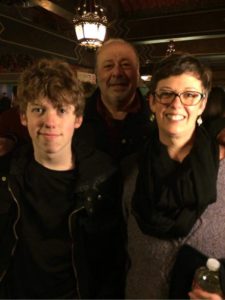
Guest blogger Kimberly lost her son Tom to suicide in March 2015 and, like many survivors, struggles to understand how she “missed” the signs. Through his passing, she has also come to understand and appreciate how similar they truly are.
Parallel Lives
One of the things I have most struggled with in understanding Tom’s suicide is my inability to recognize the symptoms of his mental illness. I am now much more educated about depression and anxiety, so I am now very reflective about what I might have missed. The only sign that stands to out to me is that Tom struggled to fall asleep at night. He would be up past my bedtime, often writing on his computer. Because he was still engaged in school, his social life, and his family, I did not read too much into it.
Tom did an excellent job of masking his pain. His grades were good in both his high school and college classes. We ate dinner together regularly and chatted about what was happening in his life. He had a great group of friends who shared his interests and sense of humor. We talked about his future education plans and trips we would take together as a family. He helped out with productions in which my husband L.J. and I were involved, putting his technology skills to great use. We laughed and joked together and exchanged good-natured teasing. We had inside jokes that made us giggle uncontrollably, often at inopportune times. I had absolutely no idea of the chaos churning inside of him.
My mother’s guilt of missing Tom’s symptoms comes up regularly at my counseling sessions. This week, I asked my counselor how and why someone with ongoing mental illness can so easily hide it. I have a hard time understanding Tom suffering so much and yet showing few if any outward signs. She told me those with depression and anxiety labor to hide the pain from those they love, often because they do not want to be a burden to them. They go through the motions of societal niceties, doing what is expected of them. It’s not until they are alone, that they remove their masks. And in Tom’s words, that’s when the Darkness comes.
Although I suffer from anxiety, in the past I have found joy from social interactions, whether at play rehearsals, in the classroom, at events, or with guests in our home. As an extrovert, these activities fed my spirit. My anxiety would typically kick in after the fact, as I replayed all of the things I did or said wrong, and I worried about what people might think of me. Did I say anything inappropriate? Did I hurt someone’s feelings? Were they laughing at me or with me? It was a strange balance of delight and fear I learned to live with through the support of family and close friends.
Tom’s death changed me. As much as I enjoy people, I find myself avoiding social situations because they are now draining. Sometimes I want to talk about Tom, and those I am with find it awkward. Other times, people want to talk about him, and I don’t. I find myself saying no to invitations I would have once accepted, because it is easier than finding the gumption to interact. I even occasionally hide when the doorbell rings because I just can’t face whoever it might be. However, once I get out of the house, I seem to be able to engage with those around me, and I think I can say I am finally starting to live again. I laugh out loud without worrying, at least in the moment, I am somehow betraying Tom’s memory with my fleeting happiness.
However, when I return home from interacting with others, sometimes even in the car on the way home, I lose it. Despair and anxiety kick in and my mind boards the “Tom Train.” I start to replay the details of the day he died, all of the things I did wrong as his mother, and how I missed the signs of his illness. I imagine his final moments and shudder and sob at his pain. If I don’t catch it in time, the train picks up speed and it suddenly runs away with me. My chest presses down, my mind races, my breathing becomes shallower, and I must work to catch my breath. I am learning to recognize the symptoms sooner and have an arsenal of tools to help me disembark, but it seems to be happening more and more often.
This week, in addition to talking about Tom’s ability to mask symptoms, I talked with my counselor about my increased anxiety, which started around November 2015. She attributed it initially to the holidays and now to the impending anniversary of his passing.
It took my counselor’s insight to show me I, too, put on a public mask of normalcy, which I remove when I am alone and able to let down my guard. Only then does my pain freely surface and overtake me, just as Tom’s did. The parallel is so obvious, but I could not see it because it was so close to me. Tom and I are so alike, feeling things so strongly, struggling daily with anxiety, and masking our pain so as to not burden others. With my counselor’s guidance, I better understand Tom’s struggle through understanding my own. Through Tom’s death, I continue to learn more about the both of us.
Copyright 2016 Kimberly Starr
About the Author
Kimberly A. Starr earned a Bachelor’s of Arts in Theatre from Whitman College and a Masters in Theatre Production from Central Washington University. She teaches Theatre Arts at Yakima Valley College and Prosser High School as well as owning StarrBright Consulting, a performance coaching business. After her son Thomas died by suicide in March 2015, she started writing as a way to process the events and her feelings. She is married to L.J. Da Corsi and is mother to Timothy and Thomas.





Kimberly,
I am deeply sorry for the loss of your dear son. Thank you for the courage to be vulnerable and share your heart and your grief journey. Like you, we lost our son to suicide in March of 2015. He had just turned 25, was not living with us, but we had a wonderful relationship. He too, hid it all from us. The mental anguish, depression, anxiety. He did not want to burden us. We were in absolute shock at the time of his death and at times, still feel like we are in a dream. The guilt struggle is real and in reading your story, I felt as if I was reading mine. Leaving my home takes monumental effort and anxiety has become real in my life and wrestles to take over. I too, am in counseling, trying to heal and learn to live with the pain of losing my dear, sweet son. My heart and my prayers are with you and your family as we live out this “new normal”. Grace to us all.
Sharon, your words are so lovely. I am so sorry for your loss as well. I am glad you found familiarity in my words. Thank you for taking the time to respond. I am grateful for our connection.
I just lost my 16 year old son to suicide. I am sorry for your loss and proud of how strong, you are. Ithe hasn’t even been a month for me.
Thank you for writing, True. I remember being numb for a long time after Tom passed. When I started writing about it, I was able to sort out and process my feelings. I am hopeful you will find a way to heal. But don’t pressure yourself; take however much time you need. Our losses are similar, but we are different and will find healing in our own way. I am sending you peace love and strength on your grief journey.